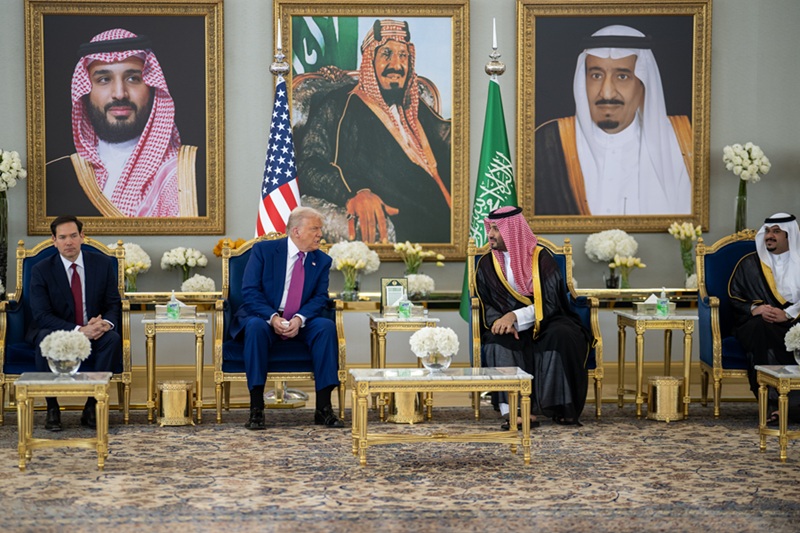In May 2025, President Donald J. Trump embarked on a high-profile Middle East tour, marking a pivotal moment in U.S. foreign policy. Over four days, Trump visited Saudi Arabia, Qatar, and the United Arab Emirates (UAE), securing over $2 trillion in investment deals and signaling a dramatic shift in America’s regional strategy.
Mega-Deals and Economic Diplomacy
President Trump’s 2025 Middle East tour produced some of the largest economic commitments in U.S. diplomatic history:
- $1.2 trillion in economic exchange agreements signed across Saudi Arabia, Qatar, and the UAE. These span defense, aviation, infrastructure, and technology.
- A $1.4 trillion investment pledge from the United Arab Emirates, focused on AI infrastructure, semiconductor manufacturing, energy, and industrial development in the U.S. — set to roll out over the next decade.
- A $600 billion package from Saudi Arabia, including a record-setting $142 billion defense deal.
- $243.5 billion in agreements with Qatar, plus the high-profile gifting of a Boeing 747-8 luxury aircraft to President Trump.
- An additional $200 billion investment initiative from the UAE covering aerospace, AI, and finance.
These monumental deals highlight Trump’s transactional, economy-first diplomacy and his pivot toward strategic investment partnerships over traditional military-first alignments.
Strategic Realignments and Policy Shifts
1. Syria Sanctions Lifted
In a significant policy reversal, Trump announced the lifting of all U.S. sanctions on Syria, citing encouragement from Turkish and Saudi leaders. He expressed hope for the country's future under its new government.
2. U.S.–Houthi Ceasefire
On May 6, 2025, a ceasefire between the U.S. and Yemen's Houthi rebels was brokered by Oman, ending U.S. airstrikes in Yemen. The Houthis agreed to halt attacks on vessels in the Red Sea but emphasized that the ceasefire did not apply to Israel.
3. Iran Nuclear Negotiations
Trump extended an offer to Iran for negotiations over its nuclear program, suggesting the potential easing of economic sanctions in exchange for curtailing nuclear development.
Israel’s Position and Regional Implications
Trump's focus on strengthening ties with Gulf states, while sidelining Israel, has raised concerns in Tel Aviv. His actions, including a deal with Hamas to free an American hostage and easing sanctions on Syria, have surprised or diverged from Israeli interests.
Broader Geopolitical Implications
Trump's Middle East tour reflects a transactional approach to foreign policy, emphasizing economic partnerships over traditional alliances. This strategy aims to counter China's growing influence in the region and reassert U.S. dominance through substantial investment deals and diplomatic engagements.
Conclusion: A New Era in U.S. Middle East Policy
President Trump's 2025 Middle East tour signifies a bold redefinition of American diplomacy in the region. By prioritizing economic agreements and engaging with a broader range of actors, the U.S. is navigating a complex geopolitical landscape with a focus on strategic flexibility and economic leverage.
